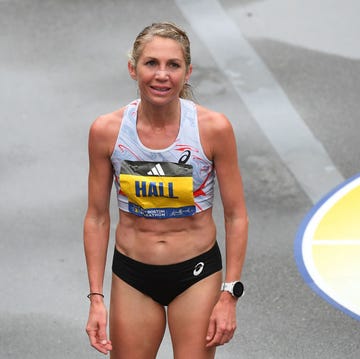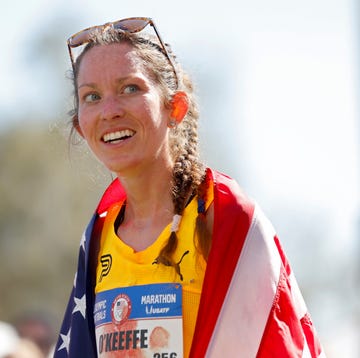When Ryan Hall, the fastest American-born marathoner in history, retired one year ago, he never felt like he found closure or said a proper goodbye to the event. On Sunday, however, he’ll embark on a personal farewell tour of grand proportions: running seven marathons, on seven continents, in seven days.
Hall, a two-time Olympian, will participate in the 2017 World Marathon Challenge, which begins with a 26.2-mile race on Monday in Union Glacier, Antarctica, and ends on Sunday, January 29, in Sydney, Australia. In between, the group will fly to and race marathons in Punta Arenas, Chile; Miami; Madrid; Marrakech, Morocco; and Dubai.
At the last race in Sydney, Hall will wear the same jersey he wore at his first marathon—the 2007 London Marathon, where he placed seventh in the 2:08:24, the fastest American debut at the distance. He says he never washed the singlet and still has its original bib pinned to it.
“The way things ended, I never had a chance to have a farewell race,” Hall said in an email to Runner’s World. “I came into the sport with an epic long run around [Big Bear Lake] in my hometown, so now I’ll go out on my own terms, with an epic run around the globe.”
With a personal best of 2:04:58, Hall retired from professional competition last January at age 33, a month before the 2016 U.S. Olympic Marathon Trials. Chronically low testosterone and extreme fatigue would no longer allow him to train at the level necessary to compete against the best runners in the world. In the past year he has CA Notice at Collection, Health - Injuries.
“I love taking on massive physical challenges, so the World Marathon Challenge has a ton of appeal as a unique and wildly adventurous race,” Hall said, “which are the only kinds of races I’m signing up for these days.”
His preparation for the week that entails not only 183.4 miles of running, but sleeping on airplanes for all but one night, was minimal. Hall started training this summer by pacing his wife, Sara Hall, who is also a professional marathoner, in her workouts. He gradually added more mileage and intensity, curious about how fast he could run the World Marathon Challenge, but backed off soon after he started, when his body began breaking down again.
In the end, Hall said his maximum mileage was about 30 miles per week and his longest run was eight miles.
“As you can imagine that wasn’t how I’ve prepared for every other marathon I’ve run, but it’s where my body is so I feel the same peace in my soul as if I would have done proper training,” Hall said, adding, “I’ve found a nice balance in training in the sense that I feel good, I’m getting stronger—I can still run, but not fast.”
Hall is also racing to raise funds and awareness for the L.A. Dream Center, a faith-based organization that addresses the needs of people experiencing homelessness, hunger, poverty, addiction, and human trafficking.
Many others involved in the challenge are also running for causes. They include BethAnn Telford of Washington, D.C., who is fighting brain cancer and is raising money for pediatric cancer research. And U.S. ultrarunner Michael Wardian, who is supporting World Vision, a Christian organization that, in part, works to bring clean water to communities around the world.
Wardian has far different goals for the challenge than Hall, however. He wants to break the record for the fastest cumulative time in the event. The current men’s record is 24:46:56, which is an average of 3:32:25 per marathon. Becca Pizzi from Belmont, Massachusetts, set the women's record in 2016, averaging 3:55:11 per marathon. To prepare for this and a long list of other 2017 races, Wardian, 42, who lives in Arlington, Virginia, runs three times a day: in the morning, at lunch, and home from work in the evening (he is an international ship broker).
“Last year I ran 47 races at a faster pace than I need to break this record,” he said. “I'm pretty confident I can do it and hopefully run sub-three hours for all the races. That would be ideal.”
Published: Jan 19, 2017 2:16 PM EST What Is Chappell Roans 5K Time. He ran the Tokyo, Boston, London, Berlin, Chicago, and New York City marathons in an average time of 2:31:09.
Hall and Wardian agree that Antarctica is the place they’re most looking forward to seeing.
“There’s not a lot of people who have that experience—I really want to see some penguins if I can,” Wardian said. “I’m nervous and intimidated by cold weather. I got frostbite when I ran the marathon at the North Pole. But it excites me too—it’s so empowering when you can face fears. There’s something to those silly clichés.”
Another challenge Wardian is preparing for is fueling. He’s a vegetarian and is concerned about the food options along way, so he packed two bags of food, including 20 packets of oatmeal, homemade granola, energy bars, almond butter, pretzel bread, ramen, and miso soup. For good measure, he also brought baby food to make sure he gets enough fruit on the journey.
“It is convenient, easy on the stomach, and tasty,” he said.
The entry fee for the challenge is steep—about $38,000, which includes flights between the destinations, polar clothing and meals in Antarctica, the race registration costs, medical support, accommodations, and other operational costs.
retired one year ago.
“I just went to everyone I know and said, ‘I have this crazy dream, do you want to help me do this?’” he said. “I think this will be really cool, I could do well at it, and it’s an adventure. I’m excited to see what kind of physical and mental toll it will take.”














